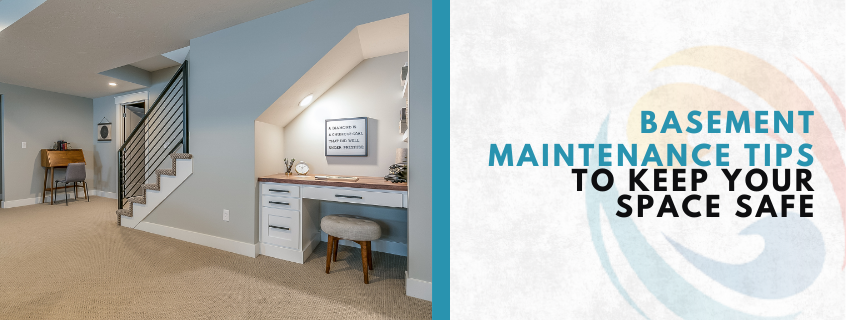
Basements are more than just extra storage. They can be home offices, family rooms, laundry areas, or even cozy hangouts. But they’re also the part of your house most likely to have moisture problems, pest issues, or hidden damage. That’s why learning smart basement maintenance tips can save you from big headaches later.
This guide will walk you through simple, smart ways to keep your basement clean, dry, and safe—all without needing fancy tools or spending tons of money. These tips are written for everyday homeowners who want real, honest help keeping their space damage-free.
Start with Water: Check for Leaks and Moisture Problems
The number one threat to any basement is water. Water can sneak in from tiny cracks, through window wells, or from high humidity. If left alone, even a little water can grow into mold or cause serious damage to walls, floors, and belongings.
When checking for water issues, here’s what you should do:
- Look for wet spots, puddles, or discolored patches on the walls or floor.
- Touch the walls and corners. If they feel damp or cold, moisture is likely present.
- Smell the air. A musty, earthy smell is usually a sign of mold or mildew.
- Pay attention after it rains. That’s the best time to find leaks coming through cracks or windows.
Make sure to seal up any cracks, fix broken window wells, and direct water away from your home with gutters and slope grading. One of the most helpful basement maintenance tips is to inspect your basement during wet weather—it gives you clues you won’t see on dry days.
If you discover serious signs of water damage, this might be the right time to get professional help from trained restoration specialists.
Test Your Sump Pump Regularly
If your basement has a sump pump, it’s your best friend when it comes to keeping things dry. But if the pump stops working, your basement could flood the next time it rains.
To test your sump pump:
- Find the pit where it sits.
- Fill it with water from a bucket.
- Watch and listen—your pump should turn on and start draining the water.
- If nothing happens, check the power and try again. If it’s still not working, it may need repair or replacement.
Other smart things to do:
- Clean the pit every few months to remove dirt and debris.
- Make sure the float switch moves freely.
- Replace the backup battery every couple of years.
These are basic but often overlooked basement maintenance tips that can save you thousands in damage. If you live near the coast or somewhere with a high water table, a service like Water Damage Restoration Pacific Palisades is even more important to keep your pump in working order.
Keep the Air Dry and Fresh
Basements are famous for being damp and musty. That’s because they’re underground, where moisture builds up easily. Too much moisture can lead to mold, bad smells, and damage to walls, paint, and furniture.
Use these tips to control the air:
- Run a dehumidifier, especially during spring and summer.
- Make sure your dryer vents to the outside, not into the basement.
- Keep windows open on dry days.
- Use fans to move air around.
If you walk downstairs and it smells earthy or musty, that’s a sign your air needs attention. One of the smartest basement maintenance tips is to use a digital humidity monitor. Keep the number below 50% to prevent mold and mildew from growing.
If the air feels sticky or smells stale, it’s time to act—before bigger problems start to grow.
Look Out for Bugs and Rodents
Basements are cozy places for unwanted visitors like mice, spiders, and bugs. They sneak in through cracks, vents, or windows and set up homes in storage boxes, behind shelves, or inside walls.
Here’s how you can stop them:
- Walk through the basement with a flashlight.
- Look for small droppings, chewed wires, or holes in corners.
- Move boxes and check behind them.
- Seal up any gaps in windows, doors, or walls.
If you find pests, clean the area and set traps or call pest control. Keep food, paper, and cloth items in sealed plastic bins, not cardboard boxes. This keeps things dry and less appealing to bugs.
One of the most overlooked basement maintenance tips is to reduce clutter. The fewer hiding spots, the less likely you’ll have a pest problem.
Declutter and Organize Everything
Clutter isn’t just messy—it’s a hazard. Boxes stacked too high can fall, and piles of stuff make it hard to spot damage or pests. Worse, cardboard can soak up moisture, grow mold, and attract bugs.
To stay organized:
- Go through everything once a year.
- Throw away things you no longer need.
- Use plastic bins instead of cardboard.
- Label each container so you can find things easily.
- Keep walkways clear and leave space around walls for inspection.
One of the easiest basement maintenance tips is to treat your basement like a useful room, not a dumping ground. The more organized it is, the safer and cleaner it stays.
Protect Pipes from Freezing in Cold Weather
If your basement gets cold in winter, the pipes can freeze. When water inside them freezes, it expands and that can cause the pipe to burst. A burst pipe can flood your entire basement in minutes.
To prevent freezing:
- Wrap pipes with foam insulation sleeves.
- Keep the heat on in your home, even in unused areas.
- Close windows and doors to hold in warmth.
- Open cabinets under sinks to let warm air reach pipes.
Another useful trick is to let a small drip run from faucets on very cold nights. This keeps water moving and lowers the chance of freezing.
Among all basement maintenance tips, this one can prevent the biggest and most expensive damage of all, so don’t skip it, especially if you live in an area with harsh winters.
Watch the Walls, Floors, and Ceiling
You might think your basement looks fine, but damage can hide in plain sight. Take time to inspect the walls, floors, and ceiling every season.
Here’s what to check:
- Are there cracks in the walls or floor?
- Is the paint peeling or bubbling?
- Are there stains that weren’t there before?
- Do ceiling tiles look warped or saggy?
These signs usually mean moisture is present. If left alone, they could lead to mold or rot.
Apply waterproof paint or sealant to basement walls to keep moisture out. Use durable flooring like vinyl or tile, and skip carpets unless you’re sure the space is completely dry.
One of the most protective basement maintenance tips is to check for changes regularly. A tiny crack now could become a major issue later.
If you think damage has already begun, this resource can help you find professional guidance.
Improve Lighting and Add Safety Features
A safe basement needs good lighting and clear pathways. If the power goes out or an emergency happens, you need to be able to get out fast.
To improve basement safety:
- Replace dim or burnt-out bulbs with bright LEDs.
- Add lights to dark corners, storage rooms, or laundry spaces.
- Install motion lights near entrances or stairs.
- Put glow-in-the-dark tape on the steps.
- Make sure handrails are secure and easy to grip.
- Keep emergency items like a flashlight, fire extinguisher, and first aid kit in an easy-to-reach spot.
If your basement is used as a bedroom or playroom, make sure it has a window or door that opens to the outside. This isn’t just smart—it’s also required in many places.
One of the simplest basement maintenance tips is this: make sure you can see where you’re going. Good lighting makes a big difference in preventing accidents.
Don’t Forget to Get a Yearly Inspection
Even if your basement looks clean and dry, hidden problems might still be waiting. Having a professional take a look once a year is a smart move.
Get experts to check:
- Plumbing and drainage
- The sump pump system
- HVAC vents and ductwork
- Foundation cracks or shifts
- Electrical systems
They’ll spot issues that you might miss and can recommend fixes before problems get worse.
Also, be sure to keep a folder or notebook with notes, receipts, and pictures of anything you’ve done. It’ll help you track what’s been fixed and what might need attention next year.Out of all the basement maintenance tips, getting regular inspections is one of the most effective and stress-free. It’s like giving your home a yearly check-up to keep it in top shape.
Frequently Asked Questions: Keeping Your Basement Safe and Clean
How do I know if my basement has a water problem?
Check for damp walls, musty smells, or stains on floors and ceilings after rain. These are early signs of leaks or moisture buildup.
What’s the best way to keep my basement dry all year round?
Use a dehumidifier, test your sump pump regularly, and seal any cracks or entry points. Good ventilation also helps control moisture.
Should I be worried about mold even if I don’t see it?
Yes, mold can grow behind walls or under flooring in damp basements. A musty smell is usually a strong warning sign.
Can cardboard boxes cause damage in my basement?
Yes, cardboard absorbs moisture and can grow mold or attract pests. Use plastic bins with lids for safe, dry storage.
How often should I inspect my basement for issues?
At least twice a year, ideally in spring and fall. Always check after heavy rains or extreme cold snaps, too.



